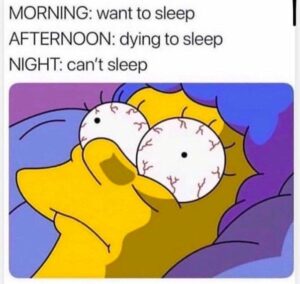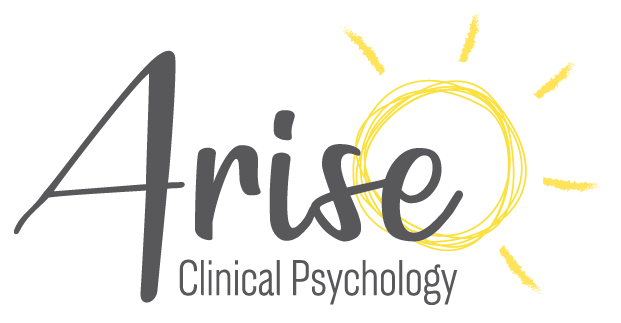
We all Do! Sleeping is quite important. Most of us know this, but around 40% of Australians report not getting enough sleep. Although it may not seem like much is happening while we sleep, healthy sleep is essential to recharge our mind and body and can prevent illness and disease.
Before we can improve our sleep, it’s important to clear up some myths about sleep and to understand the barriers to a healthy night’s sleep.
Sleep myths:
- I need EXACTLY 8 hours of sleep!
The amount of sleep we need depends on the individual. The Sleep Foundation recommends that adults need 7-9 hours of sleep, whereas teenagers need between 8-10 hours. - Alcohol will help me sleep.
Alcohol can be deceiving. Although it may make it easier to fall asleep, it reduces the quality of your sleep. - I can “catch up” on sleep over the weekend.
Unfortunately, sleep is not like a bank. You can’t put some sleep into savings for later. - My brain adapts quickly to changes in sleep schedules.
Our bodies and brains may take up to a few weeks to adjust to changes in our sleep schedules. - Watching TV in bed is helpful for sleep.
Watching TV, especially in bed, can make our minds busy and the light from the TV can interfere with our body’s ability to feel sleepy.
Why do we struggle to sleep? (Barriers to sleep)
- We don’t feel sleepy when we get into bed.
This is called “reduced sleep drive”, and it’s our physical drive to fall asleep (aka sleepiness). The longer we stay awake, the sleepier we feel. So, what causes us to have a reduced sleep drive? Not enough time being active during the day, napping for too long during the day or napping too close to sleep, spending too much time in bed, oversleeping, using caffeine or stimulants in the afternoon and evening, or consuming high sugar foods close to bed. - Off-balance body clock- interrupted body clock.
Our bodies work on a 24-hour cycle, that controls our sleep, digestion and temperature. This 24-hour cycle is influenced by many things including when we eat food, our work schedules, the timing and type of activities we do during the day. It’s complicated, but our body clocks can be off-balance when we don’t have a predictable routine. For example, irregular bedtimes or waking times, lack of structure in the day, incorrect timing of medications, use of phones at night. Jetlag or shift work can also completely throw out body clocks out of whack! - Overthinking, overstimulated, mind and body in overdrive.
Sometimes when we try to sleep our minds or bodies just feel too energised or agitated. Mental health concerns, like rumination, worry, depression, anxiety, stress and burn out can make our minds go into overdrive. Watching the clock overnight can also increase our anxiety about sleeping, making sleep much less likely. If we have caffeine or other stimulants too late, this can also cause mind and body stimulation.
Okay, so now we know why we struggle to sleep, what do we do about it?
Tips to increase sleep drive (sleepiness)
- Avoid taking naps during the day. If you really need to, aim for 20 minutes shortly after lunchtime.
- If you’re not sleeping, try to stay out of bed. This includes if you’re lying in bed unsuccessfully trying to fall asleep for longer than 20-30 minutes. Get up, move to a different room, and do something relaxing until you feel sleepy- then you and go back to bed and try to sleep again.
- Avoid having caffeine (tea, coffee, energy drinks) later in the day.
Tips for dependable body clock:
- Set a consistent bedtime and wake-up time every day. We can’t make ourselves fall asleep at a certain time, and so setting consistent wake-up times can be more effective. Over time, your body will adjust to get sleepy at the right time during the night. You want to try wake up at the same time every day (even on weekends). But if you are going to sleep-in, try not to alter the wake-up time by more than an hour.
- Try to get some morning sunlight. This can signal to our brains to release “wake-up” hormones.
- Try to avoid using your phone or other electronics before or in bed. If possible, try to disconnect from devices at least 30 minutes before bed.
Tips to reduce overstimulation and overthinking:
- Don’t watch the clock when you can’t sleep. Unless your alarm is going off, try to let go of the idea that you need to know the time. This can reduce our tendency to feel frustrated by sleeping difficulties and stop thoughts like “Great- now I only have 4 hours left to sleep”.
- Write down all your worries a few hours before bed. You can even keep this list folded up somewhere in your room to remind yourself that you don’t need to remember all your worries, and that you can address them the next day.
- Find some relaxing activities to do before bed, or when you can’t sleep. This will be different for everyone, but commonly activities like reading, meditating, or progressive muscle relaxation are helpful.
Some tips may be easy for us to implement, but others can be easier said than done. This may be especially true when it comes to trying to quieten our minds, which can often be very busy as we lie our heads down on our pillows.
Sometimes, people need extra support to improve your sleep. Seeking support from professionals, like Psychologists, can help you work out the root cause of your sleeping difficulties and find that personalised strategies that work for you.
Written by Michaela Neunborn – Clinical Psychologist Trainee
More Information
If you would like to access some extra support around some sleep issues or to book an appointment with one of our clinical psychologists, contact our superstar support team on 0457 726 171 or by emailing us at info @ arisecp.com.au

